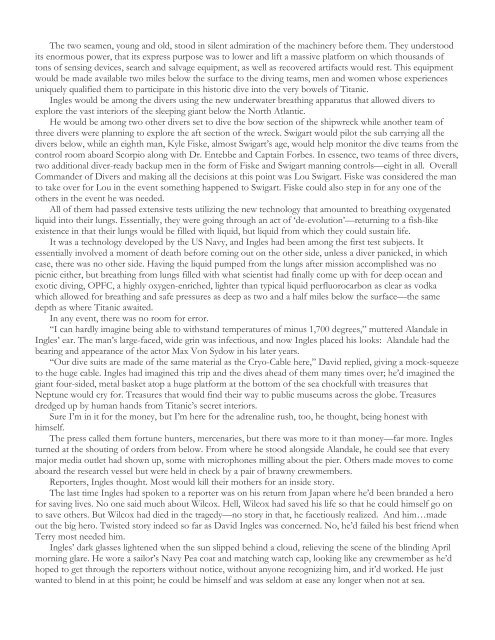Volume Three - WordPress.com — Get a Free Blog Here
Volume Three - WordPress.com — Get a Free Blog Here
Volume Three - WordPress.com — Get a Free Blog Here
You also want an ePaper? Increase the reach of your titles
YUMPU automatically turns print PDFs into web optimized ePapers that Google loves.
The two seamen, young and old, stood in silent admiration of the machinery before them. They understood<br />
its enormous power, that its express purpose was to lower and lift a massive platform on which thousands of<br />
tons of sensing devices, search and salvage equipment, as well as recovered artifacts would rest. This equipment<br />
would be made available two miles below the surface to the diving teams, men and women whose experiences<br />
uniquely qualified them to participate in this historic dive into the very bowels of Titanic.<br />
Ingles would be among the divers using the new underwater breathing apparatus that allowed divers to<br />
explore the vast interiors of the sleeping giant below the North Atlantic.<br />
He would be among two other divers set to dive the bow section of the shipwreck while another team of<br />
three divers were planning to explore the aft section of the wreck. Swigart would pilot the sub carrying all the<br />
divers below, while an eighth man, Kyle Fiske, almost Swigart’s age, would help monitor the dive teams from the<br />
control room aboard Scorpio along with Dr. Entebbe and Captain Forbes. In essence, two teams of three divers,<br />
two additional diver-ready backup men in the form of Fiske and Swigart manning controls<strong>—</strong>eight in all. Overall<br />
Commander of Divers and making all the decisions at this point was Lou Swigart. Fiske was considered the man<br />
to take over for Lou in the event something happened to Swigart. Fiske could also step in for any one of the<br />
others in the event he was needed.<br />
All of them had passed extensive tests utilizing the new technology that amounted to breathing oxygenated<br />
liquid into their lungs. Essentially, they were going through an act of ‘de-evolution’<strong>—</strong>returning to a fish-like<br />
existence in that their lungs would be filled with liquid, but liquid from which they could sustain life.<br />
It was a technology developed by the US Navy, and Ingles had been among the first test subjects. It<br />
essentially involved a moment of death before <strong>com</strong>ing out on the other side, unless a diver panicked, in which<br />
case, there was no other side. Having the liquid pumped from the lungs after mission ac<strong>com</strong>plished was no<br />
picnic either, but breathing from lungs filled with what scientist had finally <strong>com</strong>e up with for deep ocean and<br />
exotic diving, OPFC, a highly oxygen-enriched, lighter than typical liquid perfluorocarbon as clear as vodka<br />
which allowed for breathing and safe pressures as deep as two and a half miles below the surface<strong>—</strong>the same<br />
depth as where Titanic awaited.<br />
In any event, there was no room for error.<br />
“I can hardly imagine being able to withstand temperatures of minus 1,700 degrees,” muttered Alandale in<br />
Ingles’ ear. The man’s large-faced, wide grin was infectious, and now Ingles placed his looks: Alandale had the<br />
bearing and appearance of the actor Max Von Sydow in his later years.<br />
“Our dive suits are made of the same material as the Cryo-Cable here,” David replied, giving a mock-squeeze<br />
to the huge cable. Ingles had imagined this trip and the dives ahead of them many times over; he’d imagined the<br />
giant four-sided, metal basket atop a huge platform at the bottom of the sea chockfull with treasures that<br />
Neptune would cry for. Treasures that would find their way to public museums across the globe. Treasures<br />
dredged up by human hands from Titanic’s secret interiors.<br />
Sure I’m in it for the money, but I’m here for the adrenaline rush, too, he thought, being honest with<br />
himself.<br />
The press called them fortune hunters, mercenaries, but there was more to it than money<strong>—</strong>far more. Ingles<br />
turned at the shouting of orders from below. From where he stood alongside Alandale, he could see that every<br />
major media outlet had shown up, some with microphones milling about the pier. Others made moves to <strong>com</strong>e<br />
aboard the research vessel but were held in check by a pair of brawny crewmembers.<br />
Reporters, Ingles thought. Most would kill their mothers for an inside story.<br />
The last time Ingles had spoken to a reporter was on his return from Japan where he’d been branded a hero<br />
for saving lives. No one said much about Wilcox. Hell, Wilcox had saved his life so that he could himself go on<br />
to save others. But Wilcox had died in the tragedy<strong>—</strong>no story in that, he facetiously realized. And him…made<br />
out the big hero. Twisted story indeed so far as David Ingles was concerned. No, he’d failed his best friend when<br />
Terry most needed him.<br />
Ingles’ dark glasses lightened when the sun slipped behind a cloud, relieving the scene of the blinding April<br />
morning glare. He wore a sailor’s Navy Pea coat and matching watch cap, looking like any crewmember as he’d<br />
hoped to get through the reporters without notice, without anyone recognizing him, and it’d worked. He just<br />
wanted to blend in at this point; he could be himself and was seldom at ease any longer when not at sea.







